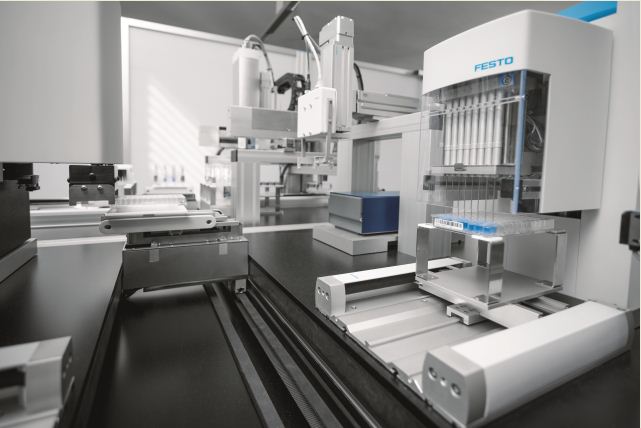Nov 17 2015
The pressure on laboratories is continuing to grow: in the age of high-throughput methods, not only do results need to be obtained quickly, but traceability and reproducibility must also be guaranteed. It helps to be able to depend on reliable manufacturers of pneumatic and electric automation technology such as Festo, whose products and solutions are available worldwide.
 Linear automation links modules within a process. The samples are automatically transported from device to device. (Photo: Festo AG & Co. KG)
Linear automation links modules within a process. The samples are automatically transported from device to device. (Photo: Festo AG & Co. KG)
Automation does not necessarily mean converting all previously manual processes to become fully automated. The transition often takes place in steps, from automating modules and automated linking of modules to fully automating entire processes, based on the needs and requirements of the laboratory. Automation is the ideal solution to the conflict of objectives between processing large numbers of samples and delivering the required high quality and reproducibility.
Modular, linear and integrated
Individual automation concepts are flexible in the degree of automation they can provide. The overall analytical process, for example, involves steps that have to be repeated over and over again every day, such as opening sample vials. Automation helps to minimise the risk of contamination and mistakes caused by repetitive work.
Linear automation links modules within a process, meaning less manual work for personnel. Since samples are automatically transported from module to module or device to device, it means that laboratory technicians no longer have to interrupt their work.
Tracing of processes
Integrated automation solutions use extremely advanced technology. Complete processes – from preparation to reading out the results – take place within a single overall system. Automation makes processes replicable and simplifies traceability. This makes it easier to comply with legal requirements and regulations.
In order for cooperation with automation manufacturers such as Festo to be successful for plant manufacturers, all parties must concentrate on their key competencies. The plant manufacturers are familiar with the laboratory processes, while Festo looks after the automation of these processes, both in the liquid handling system and in the sample handling system.
Advancement through innovations
The days when processing individual samples inevitably meant manual processing are past. The new generation of laboratory devices and systems identifies the testing requirements of primary samples with the help of barcodes, prepares the samples for the required tests and distributes them to the corresponding test stations.
Automation makes process steps such as identifying, opening and aliquoting a sample as well as loading centrifuges and incubators much more efficient and reliable. Festo develops custom solutions for many of these processes, in some cases also integrating components and devices from third-party manufacturers. These custom solutions increase sample processing productivity, enabling laboratories to process more samples in the same amount of time – regardless of whether in the pre-analytical, analytical or post-analytical phase, whether in clinical or medical laboratories or whether the samples are from humans, animals or plants.